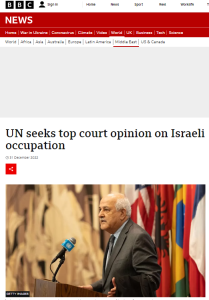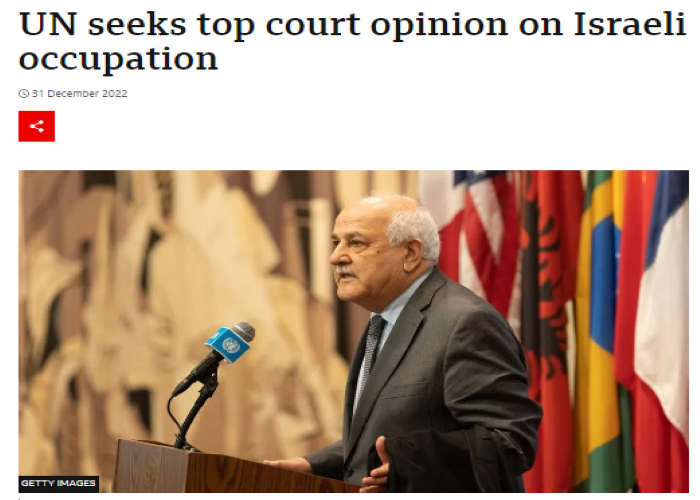For nearly a decade we have been documenting the way in which the BBC serially ignores historical events that took place before June 1967 while describing Judea & Samaria and parts of Jerusalem as places that “Israel occupied in the 1967 Middle East war”.
That means that BBC audiences are regularly deprived of the context of the Jordanian occupation of those areas as well as any background information on their status prior to that belligerent invasion and occupation.
As we noted in early 2014 in relation to Jordan’s occupation of parts of Jerusalem between 1948 and 1967:
“…accurate and impartial portrayal of that historic event would have had to include information on the fact that Jordan did annex parts of Jerusalem in 1950 and that the move was not recognised by the international community, with the exception of Pakistan. The fact that Jordanian sovereignty over parts of Jerusalem was not internationally recognised of course means that the implications of the sentence “Israel captured East Jerusalem from Jordan in the 1967 Middle East war” are not as they first appear to readers and it would then be necessary to explain what the legal status of the region was before the Jordanian invasion and occupation.
That, of course would mean having to provide BBC audiences with information on the subject of the territory assigned by the League of Nations to the creation of a Jewish National Home in 1922 – which included Jerusalem.
Of course by now, things are getting complicated and it is much more difficult to promote the political narrative selected by the BBC if one has to take into account that the only relevant legal document in existence with regard to that territory is the one which came out of the San Remo conference.
So instead the BBC elects to begin history in 1967, ignoring what went before…”
The adoption of that editorial policy also enables the BBC to attribute territory (the status of which is still subject to negotiations) to an entity which has never had any sovereignty there, as is the case in the opening line of a report published on the BBC News website’s ‘Middle East’ page late on December 31st 2022 under the headline “UN seeks top court opinion on Israeli occupation”:
“The UN General Assembly has asked the UN’s highest court to give a legal opinion on Israel’s occupation of Palestinian territories.” [emphasis added]
Readers are later told that:
“Israel occupies the West Bank, and although it pulled out of Gaza the UN still regards that piece of land as occupied territory.
Israel claims the whole of Jerusalem as its capital, while the Palestinians claim East Jerusalem as the capital of a future Palestinian state. The US is one of only a handful of countries to recognise the city as Israel’s capital.
Palestinians claim the West Bank, along with Israeli-annexed East Jerusalem, and the Gaza Strip for their hoped-for future state.”
In fact, the UN still describes – rather than “still regards” – the Gaza Strip as occupied even though Israel withdrew from the territory over 17 years ago for reasons explained here.
As ever, the BBC makes no effort to explain the history behind (or the supposed basis for) those Palestinian territorial demands. That of course means that readers cannot put a subsequent section of the BBC’s report into its correct context:
“”The Jewish people are not occupiers on their own land nor occupiers in our eternal capital Jerusalem and no UN resolution can warp that historical truth,” Mr Netanyahu said on Saturday evening.”
The BBC’s description of the outcome of the UN GA vote does not tell readers that the session was held after the start of Shabbat on a Friday, meaning that Israel could not participate, or that 53 countries abstained while others did not vote at all:
“The resolution was backed by 87 countries but opposed by 26 others, including the UK and US.”
Neither are BBC audiences informed that the resolution was proposed, inter alia, by the Palestinians. That information – as well as some background concerning the UN’s record on Israel – would obviously have been helpful to BBC audiences reading the following:
“Palestinian officials hailed the UN vote as a victory. Nabil Abu Rudeineh said it was time for Israel to be “held accountable for its ongoing crimes against our people”.”
The BBC’s report does not clarify that this resolution was already in the pipeline months before Israel’s recent election. That omission is particularly relevant given that five of the report’s 18 paragraphs promote linkage between the story about the UN GA resolution and the new Israeli government.
“Friday’s vote came a day after Benjamin Netanyahu was sworn as prime minister of the most hard-line Israeli cabinet. […]
On Thursday, Benjamin Netanyahu returned as prime minister of Israel in a coalition with ultranationalist and ultra-Orthodox Jewish allies.
The first guiding principle of the new government, published on Wednesday, declares that “the Jewish people have an exclusive and unquestionable right to all areas of the land of Israel”.
It says that includes the occupied West Bank and promises to “advance and develop” settlements there. […]
The new government has also promised to retroactively legalise some 100 outposts in the West Bank built without Israeli authorisation – and to annex the West Bank.”
And of course no BBC report on this topic is complete without the corporation’s standard partial and unhelpful portrayal of ‘international law’:
“About 600,000 Jews live in about 140 settlements built since Israel’s occupation of the West Bank and East Jerusalem in 1967.
The vast majority of the international community considers the settlements illegal under international law, though Israel disputes this.”
Once again we see that omission – both long-standing and new – hampers the ability of BBC audiences to fully understand a story which is likely to be in the news again in the months to come.






In 1948 Jordan occupied and later annexed (‘contrary to International Law’) East Jerusalem and the West Bank. Pursuant to their peace deal with Israel they formally renounced their claims to this territory in 1988.
No land was therefore stolen from anyone , unless of course one starts studying history from more convenient dates.